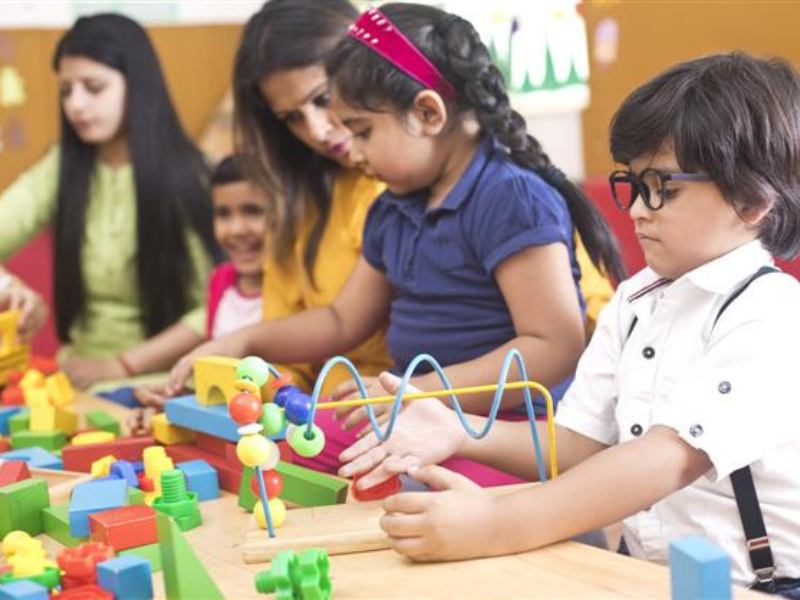April 7, Explicit tests and exams are completely inappropriate assessment tools for children up to class 2 and written tests should be introduced from class 3 onwards, the draft National Curriculum Framework (NCF) has recommended stressing that assessment methods should be such that they do not contribute to any additional burden for the child.
The framework which is being developed on the lines of new National Education Policy (NEP) suggests that two important methods of assessment that are appropriate for the foundational stage are observations of the child and analysing artefacts that the child has produced as part of their learning experience.
The draft notes that explicit tests and examinations are completely inappropriate assessment tools for the Foundational stage (preschool to class 2).
“Assessment should allow for diversity among children and in their learning. Children learn differently and express their learning differently too. There might be many ways to assess the achievement of a learning outcome or competency. The teacher should have the ability to design different kinds of assessment for the same learning outcome and use each assessment appropriately.
“Assessment should enable recording and documentation. Children’s progress should be described and analysed through systematic collection of evidence. Assessment should not contribute to any additional burden for the child. Assessment tools and processes should be designed such that they are a natural extension of the learning experience for the child,” it adds.
Describing the assessment for preparatory stage (class 3 to 5), the draft recommends that “written tests should be introduced at this stage”.
“A variety of assessment methods should be used to promote learning. Portfolios can be used to capture student progress holistically through their work. This could also provide a reliable picture of their learning to parents. Peer and self-assessments could also be introduced to help students monitor the trajectory of their own learning.
“At the end of the preparatory stage, there should be a comprehensive summative assessment of the student’s readiness to enter the middle stage where several new curricular areas are introduced,” it adds.
The education ministry released a “pre-draft” of the NCF for school education on Thursday and invited suggestions from stakeholders such as students, parents, teachers and scholars.
The draft prepared by a panel headed by K Kasturirangan, former ISRO chief, suggests that at the middle stage (class 6 to 8), the focus of the curriculum should move to conceptual understanding and higher order capacities.
“Therefore, classroom assessment techniques such as projects, debates, presentations, experiments, investigations, role plays, journals and portfolios should be used to assess learning. Regular summative assessments at this stage will help students synthesize their learning at logical intervals such as year-end, term-end, unit-end. Summative assessments comprising multiple-choice questions and constructed responses like short and long answer, may be used periodically,” it says.
In the secondary stage (class 9 to 12), the panel has asserted that comprehensive classroom assessments should be effectively practised for facilitating meaningful learning and constructive feedback. Regular summative assessments should be conducted for recording students learning against competencies.
“Self-assessment will play a key role in student learning at this stage. Students should be facilitated to monitor what they are learning and use the feedback from this monitoring to adjust, adapt, and decide their own strategies for learning.
“Summative assessments can be designed using case-based questions, simulations, and essay-type questions to enable assessment of competencies. At this stage, students should also be prepared to undertake the board examinations and other selection tests to gain access to higher education and livelihood opportunities,” the draft adds.
According to ministry officials, the textbooks as per the new NCF will be introduced from next year.
The Education Ministry has designed four NCFs based on the 5+3+3+4 curricular and pedagogical’ structure that NEP 2020 has recommended for school education.
The ministry launched the NCF for foundational stage (NCF-FS) for children between ages 3-8 years in October 2022. In continuation of that policy, the next NCF for school education is being prepared.
Revamping class 10 and 12 board exams, aligning the shift from 10+2 structure to 5+3+3+4 structure and emphasis on developmental perspectives suggesting curricular and pedagogical shifts at different stages – foundational, preparatory, middle and secondary – are among the recommendations made in the pre-draft.
The NCF has been revised four times – in 1975, 1988, 2000 and 2005. The new proposed revision will be the fifth of the framework.
Source; PTI
Also Read:
National Curriculum Framework for School Education: Great expectations
Draft NCF 2023: Board exams twice a year & subjects selection flexibility
Posted in National, News
























